Ex-Mayor Says ‘Yogurt Attack’ In Iran Vindicates International Concerns

The former mayor of Tehran has said the international community's concerns are justified about the regime, by referring to a vigilante throwing yogurt at women without hijab.

The former mayor of Tehran has said the international community's concerns are justified about the regime, by referring to a vigilante throwing yogurt at women without hijab.
Gholamhossein Karbaschi wrote in a tweet on Sunday “when there are people in the country who do not use yogurt peacefully, how the world can ensure other sensitive capabilities are used peacefully.”
The member of centrist proreform Executives of Construction Party did not explain further, but it seems he was referring to the nuclear program of the Islamic Republic, which Tehran claims to be for "peaceful purposes", but the international community is worried about intentions to build nuclear weapons secretly.
A video from the CCTV of a convenience store in Shandiz near the religious city of Mashhad went viral on social media Friday that showed a man dumping a large tub of yogurt after an argument on the head of a ‘hijabless’ woman and her mother, who was wearing a headscarf.
The man, apparently a member of the Revolutionary Guard Basij militia, had been carrying out his Islamic duty of “calling to virtue and forbidding wrong”. Local authorities said Saturday the man was arrested for disturbing public peace and insulting the women. Officials said that carrying out the duty of hijab enforcement should remain limited to verbal warnings only.
Both women were also arrested for defying hijab rules and the owner of the business was given a warning for allowing violation of the hijab law on his premises.
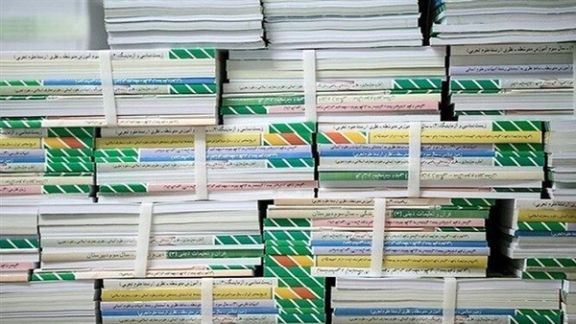
Iran’s deputy minister of education says based on the views of the Supreme Leader Ali Khamenei changes will be made in the content of foreign language textbooks.
In an interview with local media on Sunday, Ahmad Mahmoudzadeh called the decision "organizing the language schools", adding that Ali Khamenei has criticized the "content of language books" and demanded a revision.
Regarding Khamenei's criticism, he said "The conversation, pictures or anything else that is presented must be completely in conformity with the Iranian Islamic culture and customs."
Changing the content of textbooks and aligning them with regime ideology, upon Khamenei orders, has been implemented in the past few years, but this is the first time such changes will be applied to textbooks in private language schools.
Mahmoudzadeh also stated that based on Khamenei's preference, the "monopoly of the English language" in the curriculum of schools is supposed to be broken.
In recent years, Khamenei has taken a position against teaching English in Iranian schools.
In 2016, Ali Khamenei harshly criticized the promotion of learning English in Iranian educational institutions. "Now, we have reached a point where teaching the English language is extended to kindergartens and daycares, as well," he retorted.
Immediately after Khamenei's remarks, the Ministry of Education banned English teaching in primary schools.
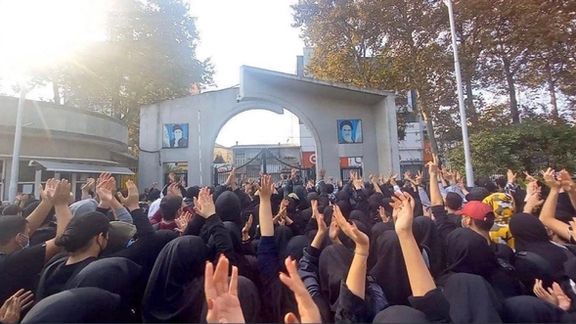
Iran’s health and education ministries say their educational centers will not be providing services to students who do not observe the mandatory hijab.
In a message to congratulate the opening of universities in the new Iranian year on Monday, Deputy Health Minister Abbas Shirojan thanked the students who comply with dress code, and announced the universities of the health ministry will not provide services to students without hijab.
Meanwhile, the education ministry in a separate statement announced that women who do not comply with the compulsory hijab will not be allowed to attend classes.
During the nationwide protests in Iran following the death in custody of Mahsa Amini, universities have been the hotbed of protests with hundreds of students were arrested, in addition to targeted poisoning attacks on girls’ schools.
As the regime fights a losing battle against the wave of women participating in a nationwide hijab rebellion, hardliner regime supporters vow more strict measures.
In recent days, dozens of shops and malls where Iranian women continue to flout the regime’s mandatory hijab rules have been closed down across the country with dozens more women arrested.
In the past four decades women generally demonstrated their opposition to compulsory hijab by making their headscarves smaller.
Defiance of hijab rules as a form of civil disobedience ha grown across the country after the death the 22-year-old Mahsa Amini in custody of morality police in mid-September.
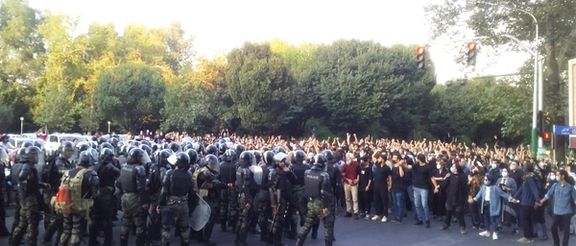
A leading reformist figure in Iran says the Iranian regime has shifted its point of reliance and source of legitimacy from the people to the military.
Mohsen Mirdamadi said in an interview with Etemad newspaper that revolutions and revolutionaries generally know what they don't want, but they do not have a clear idea about what they really want. Many revolutionaries typically find out after several years that many of their ideas and ideals cannot materialize. This is what happened in Iran after the 1979 revolution.
Mirdamadi said that two major shifts happened in Iran after the Islamic revolution. First, a school of thought that did not believe in the people's vote got the upper hand and tried to limit the power of votes and elections. Many of those in the Iranian government belong to this current.
The second shift occurred in the point of the regime's reliance. Gradually the regime began to rely on its military forces rather than on the support of the people.
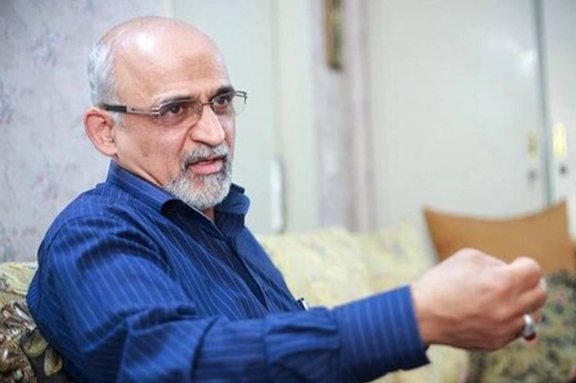
Elsewhere in the interview, Mirdamadi criticized the Iranian rulers' approach to enforcing hijab. He said that hardliners made hijab a security issue rather than a social issue about lifestyle. These changes, said Mirdamadi, led to the protests in the autumn of 2022 and plunged the country into its most important crisis in four decades.
Mirdamadi added that currently it is the military that makes most decisions in the economy, as well as domestic and foreign policies. The result is an unhappy population.
Like many other commentators, Mirdamadi also believes that recent protests were not simply the result of Mahsa Amini's death in custody. The protests were the outcome of accrued unhappiness and dissatisfaction. He added that the apparent lull in the street protests does not mean the movement has ended. This is a point also shared by others including leading conservative figure and regime insider Mohammad Reza Bahonar, who is a member of the Expediency Council.
Meanwhile, another conservative figure, lawmaker Mostafa Mirsalim in an interview with Khabar Online warned that the next parliamentary elections in less than a year is likely to be adversely affected by political corruption and political factions whose interests can be served only based on lack of transparency in the system and winning illegitimate concessions from the center of power.
In unprecedented comments, the hard-line conservative lawmaker acknowledged that most Iranians lost their hope in the system as a result of regime’s behavior and the only thing that can restore hope in the system is introducing social justice. However, he did not say how social justice can work in a political atmosphere overwhelmed by corruption and concessions for the privileged few and the progeny of men of power.
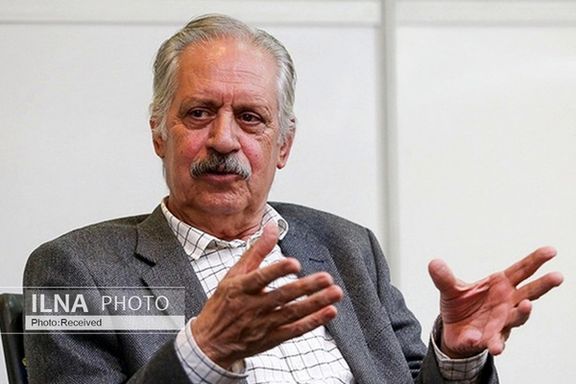
Meanwhile, international relations analyst Ali Bigdeli said in an interview with ILNA that hardliners who boasted about belittling the United States and turning the White House into a Mausoleum have brought about misery for Iran and made it a backward country.
Bigdeli advised that Iranian rulers should change their attitude toward the world and do away with emotionally charged statements against other country. He said reaching agreement with Saudi Arabia to restore ties is a good example of how flexible Iran needs to be in its foreign policy.
Nonetheless, Bigdeli slammed the Foreign Ministry for making ad hoc decisions rather than following a pre-defined strategic vision. He charged that the Foreign Ministry certainly lacks a roadmap about how to further Iran's relations with what he called "imperialist" countries, presumably the United States, China and Russia, and even the Persian Gulf littoral states. Lack of such a defined policy will do harm to Iran's interests, Bigdeli said.
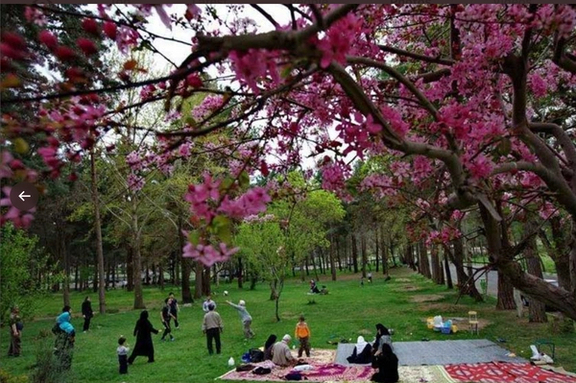
Iranian families celebrated the ancient Spring Picnic Day (Sizdabedar) on Sunday despite the government’s closure of some parks and Ramadhan restrictions.
“Out of respect for the month of Ramadan,” authorities closed parks and blocked roads to northern forests and other locations where people traditionally picnic on this day but videos posted on social media show huge crowds singing and dancing despite the restrictions and even chasing away the government-sponsored vigilantes from their picnic grounds.
In the city of Qazvin, capital of Qazvin province, for instance, the municipality said parks were closed until five in the afternoon, an hour and a half before iftar (the end of fasting day) “for the comfort of citizens and respect for Ramadhan.”
Armed police attacking merrymaking people with tear gas in northern Iran.
Parks were also closed in several other cities including the religious city of Qom and Rasht in Gilan province where many have flocked for the holidays. Even some museums and sightseeing locations were closed for the day in some places such as Kermanshah in western Iran.
Such restrictions did very little to stop people from gathering and dancing wherever they could but at least in one place, on the road to the touristic village of Masouleh in the forested northern mountains of the Caspian Sea region, armed police tried to disperse the merrymaking crowds with tear gas. Social media users said in Tehran the Basij militia tried to prevent people from entering some parks, but the crowds were too big and they had to give way.
This year, many women have taken the opportunity of the secular Nowrouz holiday season to demonstrate their opposition to the government by flouting their hijab and dancing in public as civil disobedience.
Authorities, who have been rattled by mass defiance, responded by shutting down businesses, hotels, cafes and restaurants where “hijabless” women were offered services or sang and danced, often alongside men. In some cases, such as at Kermanshah’s Taq Bostan historical site, authorities prevented “hijabless” women from entering.
People including “hijabless” women celebrating Sidebedar in Rasht in northern Iran
The 13th day of the holidays is called Sizdebedar, or more correctly Sizdah be Dar (casting off [the inauspiciousness] of thirteen].
The regime reluctantly tolerates some of the country’s ancient festivals such as the New Year (Nowruz) and other occasions such as Charshanbeh Souri (Last Tuesday of the old year) and Sizdebedar due to their extreme popularity. Nevertheless, after the Islamic Revolution of 1979 it renamed Sizdebedar as Nature Day because the religious establishment particularly opposed the “superstition” implied by it.
People chasing away government sponsored vigilantes in Anzali from their picnic site.
People should not remain home on this day to avoid the inauspiciousness of the number thirteen according to a tradition of obscure origins. So, they will go out and picnic wherever they can with food and music and dancing.
But this year, the Iranian New Year holidays (Nowrouz) coincided with the Islamic fasting month of Ramadan.
In Iran and some other Islamic countries eating, drinking, and smoking in public are strictly banned during the fasting month. Many Iranians who fast during Ramadan, and many others who do not, nevertheless, believe that such restrictions are pointless and even unfair.

The Israeli army said it downed an unidentified aircraft on Sunday that appeared to have crossed into its territory from Syria, as tensions simmer in the region.
The Israel Defense Forces (IDF) said in a statement the aircraft it downed did not pose a threat at any stage.
Israel has for years carried out attacks against what it has described as Iran-linked targets in Syria. According to the Syrian Observatory for Human Rights, Israel conducted six strikes in Syrian territory in March alone.
Israel conducted three missile and air strikes from Thursday to Sunday on targets in Syria housing Iranian IRGC and proxy military forces.
Iran announced that two of its "military advisers" in Syria were killed in these attacks and warned that it would retaliate.
Israel has been regularly attacking targets in Syria since 2017 to weaken Iran's attempts to strengthen its military presence in the war-torn country and build up a threat on Israel's northern borders.
Iran has considerable drone capabilities that it has used against US bases in Syria as recently as last month, killing a US contractor and injuring at least eight US servicemen.
Iran's government spokesman, Ali Bahadori-Jahromi, tweeted Sunday that Israel's "terrorist acts will not remain unanswered."
Iran had also called on Palestinian militants to "use the opportunity" of internal political tensions in Israel to harm the "Zionist enemy."